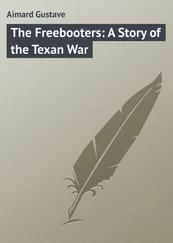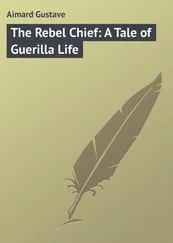Gustave Aimard - The Red Track - A Story of Social Life in Mexico
Здесь есть возможность читать онлайн «Gustave Aimard - The Red Track - A Story of Social Life in Mexico» — ознакомительный отрывок электронной книги совершенно бесплатно, а после прочтения отрывка купить полную версию. В некоторых случаях можно слушать аудио, скачать через торрент в формате fb2 и присутствует краткое содержание. Жанр: foreign_prose, foreign_adventure, на английском языке. Описание произведения, (предисловие) а так же отзывы посетителей доступны на портале библиотеки ЛибКат.
- Название:The Red Track: A Story of Social Life in Mexico
- Автор:
- Жанр:
- Год:неизвестен
- ISBN:нет данных
- Рейтинг книги:3 / 5. Голосов: 1
-
Избранное:Добавить в избранное
- Отзывы:
-
Ваша оценка:
- 60
- 1
- 2
- 3
- 4
- 5
The Red Track: A Story of Social Life in Mexico: краткое содержание, описание и аннотация
Предлагаем к чтению аннотацию, описание, краткое содержание или предисловие (зависит от того, что написал сам автор книги «The Red Track: A Story of Social Life in Mexico»). Если вы не нашли необходимую информацию о книге — напишите в комментариях, мы постараемся отыскать её.
The Red Track: A Story of Social Life in Mexico — читать онлайн ознакомительный отрывок
Ниже представлен текст книги, разбитый по страницам. Система сохранения места последней прочитанной страницы, позволяет с удобством читать онлайн бесплатно книгу «The Red Track: A Story of Social Life in Mexico», без необходимости каждый раз заново искать на чём Вы остановились. Поставьте закладку, и сможете в любой момент перейти на страницу, на которой закончили чтение.
Интервал:
Закладка:
"Nonsense!" Carnero remarked with a grin of derision, "do not believe what that man tells you; the mezcal has got into his head, and he is trying to make himself of importance; Indians tell as many lies as old women."
The Indian's eye flashed; without deigning to reply he drew a moccasin from his breast, and threw it so adroitly at the capataz as to strike him across the face. Furious at the insult so suddenly offered him by a man whom he always considered inoffensive, the half-breed uttered a yell of rage, and rushed knife in hand on the Indian.
But the latter had not taken his eye off him, and by a slight movement he avoided the desperate attack of the capataz; then, drawing himself up, he caught him round the waist, raised him from the ground as easy as he would have done a child, and hurled him into the fire, where he writhed for a moment with cries of pain and impotent passion. When he at length got out of the fire, half scorched, he did not think of renewing the attack, but sat down growling and directing savage glances at his adversary, like a turnspit punished by a mastiff. The master had witnessed this aggression with the utmost indifference, and having picked up the moccasin, which he carefully examined —
"The Indian is right," he said, coldly, "this moccasin bears the mark of the Crow nation. My poor Carnero, you must put up with it, for though the punishment you received was severe, I am forced to allow that it was deserved."
The redskin had begun smoking again as quietly as if nothing had occurred.
"The dog will pay me for it with his traitor face," the capataz growled, on hearing his master's warning. "I am no man if I do not leave his body as food for the crows he discovers so cleverly."
"My poor lad," his master continued, with a jeer, "you had better forget this affair, which I allow might be disagreeable to your self-esteem; for I fancy you would not be the gainer by recommencing the quarrel."
The capataz did not answer; he looked round at the spectators to select one on whom he could vent his spite, without incurring any extreme risk; but the peons were on their guard, and offered him no chance. He then, with an air of vexation, made a signal to two men to follow him, and left the circle grumbling.
The head of the caravan remained for a few minutes plunged in serious thought; he then withdrew beneath his tent, the curtain of which fell behind him; and the peons lay down on the ground, one after the other, with their feet to the fire, and carefully wrapped up in their serapes, and fell asleep.
The Indian then took the pipe stem from his mouth, looked searchingly around him, shook out the ashes, passed the pipe through his belt, and, rising negligently, went slowly to crouch at the foot of a tree, though not before he had taken the precaution of wrapping himself in his buffalo robe, a measure which the sharp air rendered, if not indispensable, at any rate necessary.
Ere long, with the exception of the sentries leaning on their guns and motionless as statues, all the travellers were plunged in deep sleep, for the capataz himself, in spite of the promise he had made his master, had laid himself across the entrance of the tent.
An hour elapsed ere anything disturbed the silence that prevailed in the camp. All at once a singular thing happened. The buffalo robe, under which the Indian was sheltered, gently rose with an almost imperceptible movement, and the redskin's face appeared, darting glances of fire into the gloom. In a moment the guide raised himself slowly along the trunk of the tree against which he had been lying, embraced it with his feet and hands, and with undulating movements resembling those of reptiles, he left the ground, and raised himself to the first branches, among which he disappeared.
This ascent was executed with such well-calculated slowness that it had not produced the slightest sound. Moreover, the buffalo robe left at the foot of the tree so well retained its primitive folds, that it was impossible to discover, without touching it, that the man it sheltered had left it.
When the guide was thoroughly concealed among the leaves, he remained for a moment motionless; though not in order to regain his breath after having made such an expenditure of strength, for this man was made of iron, and fatigue had no power over him. But he probably wished to look about him, for with his body bent forward, and his eyes fixed on space, he inhaled the breeze, and his glances seemed trying to pierce the gloom.
Before selecting as his resting place the foot of the tree in which he was now concealed, the guide had assured himself that this tree, which was very high and leafy, was joined at about two-thirds of its height by other trees, which gradually rose along the side of the mountain, and formed a wall of verdure.
After a few minutes' hesitation, the guide drew in his belt, placed his knife between his teeth, and with a certainty and lightness of movement which would have done honour to a monkey, he commenced literally hopping from one tree to another, hanging by his arms, and clinging to the creepers, waking up, as he passed, the birds, which flew away in alarm.
This strange journey lasted about three-quarters of an hour. At length the guide stopped, looked attentively around him, and gliding down the trunk of the tree on which he was, reached the ground. The spot where he now found himself was a rather spacious clearing, in the centre of which blazed an enormous fire, serving to warm forty or fifty redskins, completely armed and equipped for war. Still, singular to say, the majority of these Indians, instead of their long lances and the bows they usually employ, carried muskets of American manufacture, which led to the supposition that they were picked warriors and great braves of their nation; and this, too, was further proved by the numerous wolf tails fastened to their heels, an honourable insignia which only renowned warriors have the right to assume.
This detachment of redskins was certainly on the war trail, or at any rate on a serious expedition, for they had with them neither dogs nor squaws. In spite of the slight care with which the Indians are wont to guard themselves at night, the free and deliberate manner in which the guide entered their encampment proved that he was expected by these warriors, who evinced no surprise at seeing him, but, on the contrary, invited him with hospitable gestures to take a seat at their fire. The guide sat down silently, and began smoking the calumet which the chief seated by his side immediately offered him. This chief was still a young man, his marked features displaying the utmost craft and boldness. After a rather lengthened interval, doubtless expressly granted the visitor to let him draw breath and warm himself, the young chief bowed to him and addressed him deferentially.
"My father is welcome among his sons; they were impatiently awaiting his arrival."
The guide responded to this compliment with a grimace, in all probability intended to pass muster for a smile. The chief continued: —
"Our scouts have carefully examined the encampment of the Yoris, and the warriors of the Jester are ready to obey the instructions given them by their great sachem, Eagle-head. Is my father Curumilla satisfied with his red children?"
Curumilla (for the guide was no other than the reader's old acquaintance the Araucano chief) laid his right hand on his chest, and uttered with a guttural accent the exclamation, "Ugh!" which was with him a mark of the greatest joy.
The Jester and his warriors had been too long acquainted with Curumilla for his silence to seem strange to them; hence they yielded without repugnance to his mania, and carefully giving up the hope of getting a syllable out of his closed lips, began with him a conversation in signs.
We have already had occasion, in a previous work, to mention that the redskins have two languages, the written and the sign language. The latter, which has among them attained a high perfection, and which all understand, is usually employed when hunting, or on expeditions, when a word pronounced even in a low voice may reveal the presence of an ambuscade to the enemy, whether men or beasts, whom they are pursuing, and desire to surprise.
Читать дальшеИнтервал:
Закладка:
Похожие книги на «The Red Track: A Story of Social Life in Mexico»
Представляем Вашему вниманию похожие книги на «The Red Track: A Story of Social Life in Mexico» списком для выбора. Мы отобрали схожую по названию и смыслу литературу в надежде предоставить читателям больше вариантов отыскать новые, интересные, ещё непрочитанные произведения.
Обсуждение, отзывы о книге «The Red Track: A Story of Social Life in Mexico» и просто собственные мнения читателей. Оставьте ваши комментарии, напишите, что Вы думаете о произведении, его смысле или главных героях. Укажите что конкретно понравилось, а что нет, и почему Вы так считаете.












